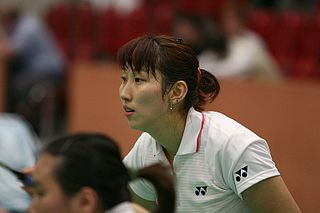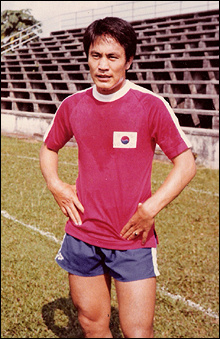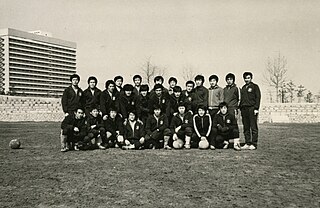Related Research Articles

The national flag of the Democratic People's Republic of Korea, commonly known as North Korea, consists of a wide horizontal red stripe bordered above and below by a thin white stripe and a broad blue stripe. The red stripe is charged near the hoist with a five-pointed red star inside a white circle. The design of the flag is defined in the North Korean constitution and regulations regarding the use and manufacture of the flag are outlined in the country's national flag law. The North Korean government credits Kim Il Sung, the country's founder and first leader, as the designer of the flag. The flag was officially adopted on September 8, 1948, with the passing of North Korea's first constitution by the Supreme People's Assembly. The North Korean flag is banned in South Korea by the National Security Act.

Lee Hyo-jung is a South Korean former badminton player.

Hwang Sun-hong is a South Korean former football player and current manager of the South Korea national under-23 football team and manager of Daejeon Hana Citizen. He was the most notable South Korean striker in the 1990s and early 2000s.

The South Korea men's national basketball team represents South Korea in international basketball competitions. They are administered by the Korea Basketball Association.
Chung So-young is a former badminton player from South Korea. She was a gold medalist at the Barcelona Olympics in 1992 in the women's doubles together with Hwang Hye-young, and was inducted into the Badminton Hall of Fame in 2003.
Lee Tae-ho is a South Korean former professional footballer who played as a forward. He spent his entire career playing for the Daewoo Royals. In the history of the FIFA World Cup, he was the first player to be blind in one eye.
Kim Yong-sik was a South Korean football player and manager. He is esteemed as the godfather of the South Korean football.
The South Korea national under-20 football team represents South Korea in international youth football competitions and also can be managed as under-18 or under-19 team if necessary. South Korean under-20 team won twelve AFC U-20 Asian Cup titles and reached the FIFA U-20 World Cup final once, both are the most successful results among Asian teams.
Chung Hae-won was a South Korean football player and coach.

Cha Kyung-bok was a South Korean football manager.
Cho Yoon-ok was a South Korean football player and manager. Considered one of Asia's greatest inside forwards in the 1960s, Cho led South Korea to an AFC Asian Cup title. He also participated at the 1964 Summer Olympics.
Kim Ji-sung was a South Korean football midfielder who played for the South Korean national team in the 1954 FIFA World Cup.
Huh Yoon-jung was a South Korean footballer who played as a forward.

South Korea, officially the Republic of Korea, competed at the 2016 Summer Olympics in Rio de Janeiro, Brazil, from 5 to 21 August 2016. This was the nation's seventeenth appearance at the Olympics. The Korean Olympic Committee sent the nation's smallest ever delegation to the Games in Olympic history since 1984. A total of 205 athletes, 103 men and 101 women, competed in 24 sports.

Ryu Han-Su is a South Korean Greco-Roman wrestler who competes in the 66 kg division. He entered Kyungsung University's Department of Sports and Health in 2006. He reached the final of the 2013 World Wrestling Championships in the same division and also won the gold medal.
Sim Myeong-hui is a South Korean former sports shooter. He competed in the trap event at the 1960 Summer Olympics.
Kim Bong-yu is a South Korean middle-distance runner. He competed in the men's 1500 metres at the 1992 Summer Olympics. He holds the South Korean national record for the indoor 1500 metres with his best of 3:47.95 minutes. He was the bronze medalist at the 1993 East Asian Games behind teammate Kim Soon-hyung and China's Lin Jun.

Hwang Jae-man was a South Korean former football player and manager, playing as a left-back and midfielder. He is known as a long throw-in during his playing days, and has scored on several occasions with mid-range shots based on powerful kicks. He also displayed solid defensive skills with strong man-to-man marks, and from his twilight years onwards, he captained the club and South Korea, demonstrating leadership.

Park Soo-il was a South Korean former footballer and football manager who played as a forward. He was known for his bold breakthrough and constant mobility to create decisive opportunities during his time as a player. In addition, during his tenure as head coach of Soongsil University, he coached several star players such as Choi Jin-cheul and is largely credited for converting Choi Jin-chul from a forward to a defender.

Jeong Kang-ji is a South Korean former footballer who played as a forward. He played for Yangzee and Korea Trust Bank on a club level and represented South Korea at the 1966 Asian Games and the 1970 Asian Games where he was part of the winning squad in the football tournament.
References
- ↑ Evans, Hilary; Gjerde, Arild; Heijmans, Jeroen; Mallon, Bill; et al. "Bong Ug-won Olympic Results". Olympics at Sports-Reference.com. Sports Reference LLC. Archived from the original on 17 April 2020. Retrieved 22 March 2019.
- ↑ 一次選拔續開世界레스링派遣 [First qualifying tournament for World Wrestling Championships continues]. The Dong-A Ilbo . 17 July 1959. p. 2. Retrieved 7 April 2020– via Naver News Library.
- ↑ "『레스링』選拔戰績世界大會파견選手" [Wrestling: Results of athletes chosen for World Wrestling Championships]. The Dong-a Ilbo . 18 April 1961. p. 2. Retrieved 7 April 2020.